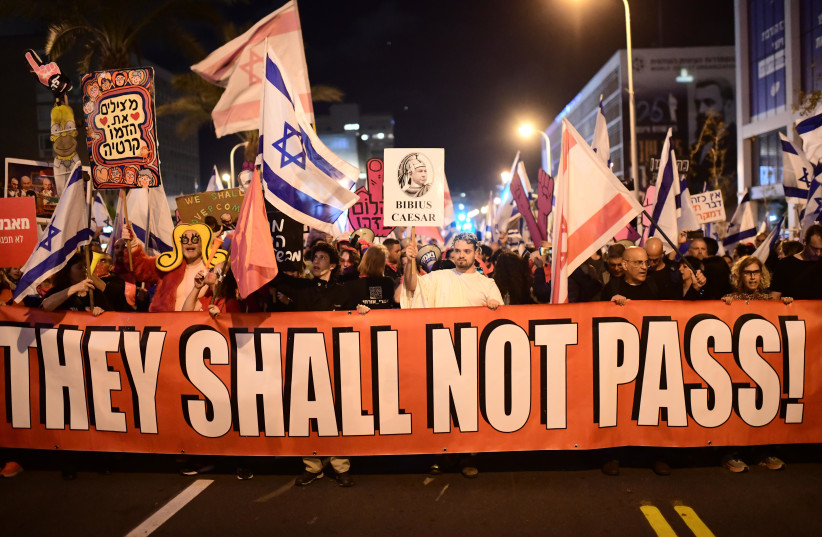The list of sins that we collectively recite and for which we ask forgiveness repeatedly as we approach Yom Kippur includes “raised eyes” and “stretching forth the neck” – in other words, arrogance or haughtiness.
And it is this trait, more than anything else, that is responsible for Israel’s existential political crisis.
The main actors taking the public stage – politicians, judges, rabbis, journalists, academics, ex-generals, and hi-tech entrepreneurs, insist that they are entirely correct and morally righteous, and those with other views are unequivocally and irredeemably evil. And not only “the other side” – anyone who sees the issues as other than black and white is similarly reviled.
Therefore, for virtue to triumph, the zealots make the lives of the evil-doers miserable, shouting them down and harassing them and their families wherever they may be. For many, taking complex and principled positions that go against the prevailing mood becomes too costly – it is easier and healthier to stay quiet and avoid vicious confrontations.
Arrogance also breeds counter-arrogance
When someone is harassed and told that their beliefs, behavior, and ways of viewing the world are wrong-headed, primitive, or immoral, the instinctive response is to double down and respond in kind.

The self-righteousness that characterized Israel’s liberal secular judicial revolution of 30 and 40 years ago triggered the determination of others whose values are conservative, religious, and particularist to reverse this outcome.
In functioning societies, and particularly in democracies, differences over ideologies, priorities, and policies are meant to be managed – and eventually resolved – through informed discourse and debate.
For such processes to take place, the different groups must listen to each other, and, on occasion, change their views when presented with cogent and coherent arguments. The combination of arrogance and unchecked power is particularly dangerous, creating conditions for replacing debate and argument with imposed positions, values, and lifestyles.
A primary theme in the initial protests against the sweeping judicial reform package was the perceived effort to exploit state power to erase checks and balances that stop the government from canceling minority views. In parallel, reform supporters accuse elite judges and prosecutors of using unaccountable power to impose their particular priorities and ideologies.
As the opposition campaign evolved, the protest leaders demonstrated their own power to coerce, by blocking main highways and the airport, while also subjecting “the enemy” – members of the Knesset, ministers, and private researchers (Kohelet) – to 24/7 harassment. In addition, the declaration by IDF reserve officers that they would refuse to serve under the current government (using judicial reform as a justification) constitutes a direct and very tangible threat to the security of all Israeli citizens.
Another front in the “We are right and moral, they are wrong and evil” battle is the attempt to enlist external influence and leverage, particularly in the US.
The protest leaders have been very effective in getting their absolutist message out and gaining the endorsement of President Joe Biden and New York Times opinion guru Tom Friedman, as well as influential American Jewish leaders. (This is not unique – Israeli politicians and champions of various causes are closely tied to, and reliant on, support groups and donors in the US and other Diaspora communities.) The external support gives the protesters even more power in the internal Israeli battleground and makes the compromise and cooperation necessary for a functioning democracy even more difficult to achieve.
The opposites of, and the antidotes to arrogance are humility and modesty, which are fundamental requirements for cooperation and compromise.
Moses, the Jewish archetypal leader, is repeatedly praised as having these qualities. Samuel and the Jewish prophets who are also described as modest, in contrast to the arrogant and powerful kings they confronted.
The biblical text and the rabbinical interpretations acknowledge the difficulty of remaining humble and avoiding the temptations of power. But modern sound-bites and Tiktok-based politics discourage humility and modesty, and many of our current leaders, like their foreign counterparts, appear to have lower thresholds in this respect.
These themes are central to the period of introspection and atonement that begins on the first day of the Hebrew month of Elul, and culminates on Yom Kippur. The texts we read during the Ten Days of Repentance emphasize the fragility of human existence and the importance of humility.
Beyond reciting the words and ritually acknowledging our “raised eyes” and “stiff necks,” this is an opportunity to step back and reconsider the actions that are propelling us into ever-increasing conflict.
The writer is professor emeritus of politics at Bar- Ilan University and president of NGO Monitor.
